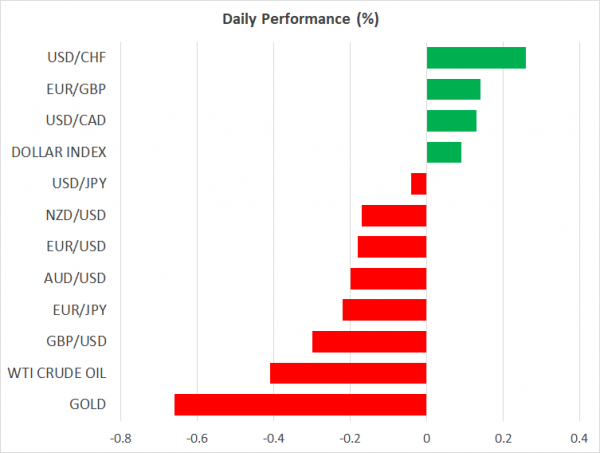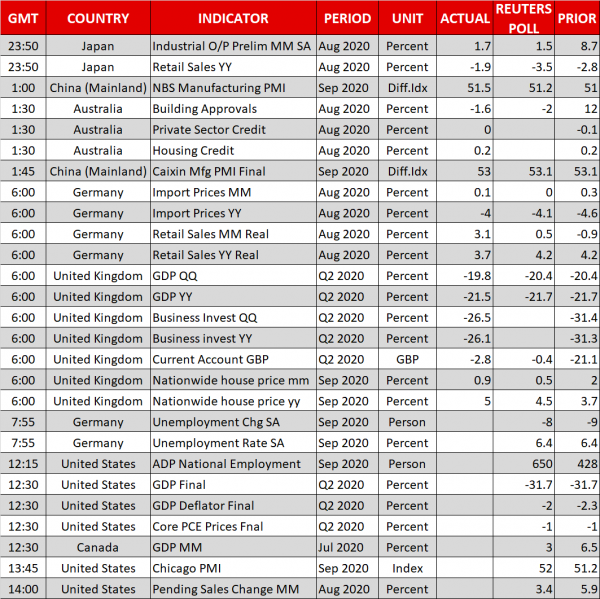- Stocks edge lower after debate as Trump keeps door open to contest result
- Otherwise, not much to move the needle in this race
- Focus now turns back to stimulus talks that will resume today
- Euro advances, but can it keep going if euro area stays in deflation?
Presidential debate leaves markets wanting
Uncertainty about the election outcome seems to have intensified after the first debate between Donald Trump and Joe Biden, which yielded no clear winner as both men landed some jabs. Biden did not ‘melt down’ as some had expected and instead held his own, while Trump tried to inject as much chaos as possible by interrupting constantly.
Wall Street futures climbed while the debate was raging but erased all those gains to trade much lower by the end, once the subject of mailed ballots came up and Trump refused to commit to a peaceful transfer of power. He insisted that there will be cases of fraud and kept the door open for contesting the result in the Supreme Court, adding that the winner may not be decided for months.
The last time this happened was back in 2000 with the Bush-Gore debacle, and the stock market fell by 12% over the next five weeks. This is probably what has spooked investors today, with e-mini futures tracking the S&P 500 pointing to a 1% loss at the open.
Admittedly, this is likely just an empty threat by Trump. Opinion polls show that people are less likely to vote at all if they believe the result will be contested, and a lower turnout favors the Donald because his base is very loyal to him and will vote no matter what. Still, investors are rightfully pricing in a probability that this scenario might play out, as Trump would have nothing to lose if he comes up short on election night anyhow.
Stimulus talks resume today – brace for turbulence
Back to the markets, the main event today will be the negotiations for another relief package. The White House came back with a counterproposal of roughly $1.6 trillion yesterday, and while that is still far from the $2.2 trillion the Democrats demand, it is clear the two sides are moving closer.
The time window for reaching a deal is closing fast and whether we see some more progress today might be what determines the next ‘big’ move in both the dollar and equities. Strategically speaking, since Trump is lagging in the polls and wasn’t really able to score a ‘victory’ in the first debate, he seems quite likely to push for a deal now.
He needs to make something happen, and another round of stimulus checks to people right before the election could do the trick. If the negotiations finally bear fruit, the stock market could charge higher and the dollar might slide on renewed deficit concerns, particularly versus risk-sensitive currencies like the aussie. The opposite reactions would likely take place in case of no deal.
Euro climbs, but can it hold on?
In FX land, the euro was the star performer yesterday even despite the mild risk-off tone in the broader market and without any real news to justify the ascent. If anything, news flow was euro-negative, as German Chancellor Merkel warned that the EU recovery fund may be delayed.
Instead, this rally may come down to month-end and quarter-end flows distorting the picture. All told, the near-term outlook for the euro remains somewhat grim. The virus situation is still not under control in many countries, and if the upcoming inflation numbers on Friday show the bloc is stuck in deflation, the ECB will almost have no choice but to ramp up its stimulus dose again.
As for today, the ADP jobs report from the US will give us a taste of what to expect from the official employment data on Friday. There’s also a litany of central bank speakers, including the BoE’s Haldane (08:30 GMT), the ECB’s de Cos (09:00 GMT) and Lane (14:00 GMT), and the Fed’s Bowman (17:40 GMT).


